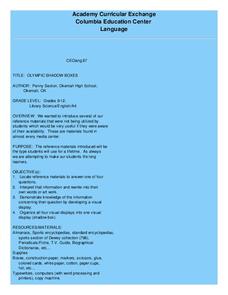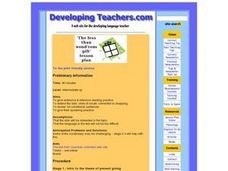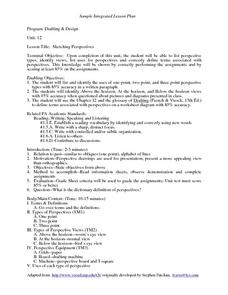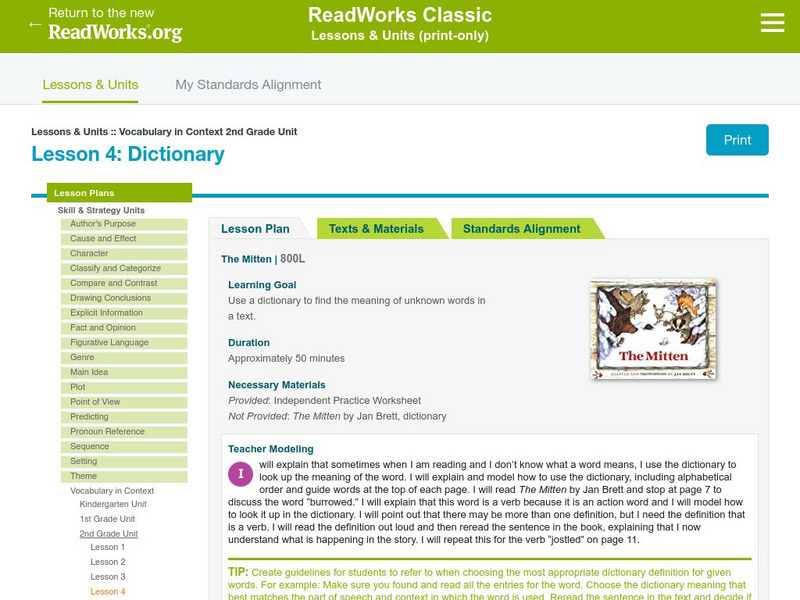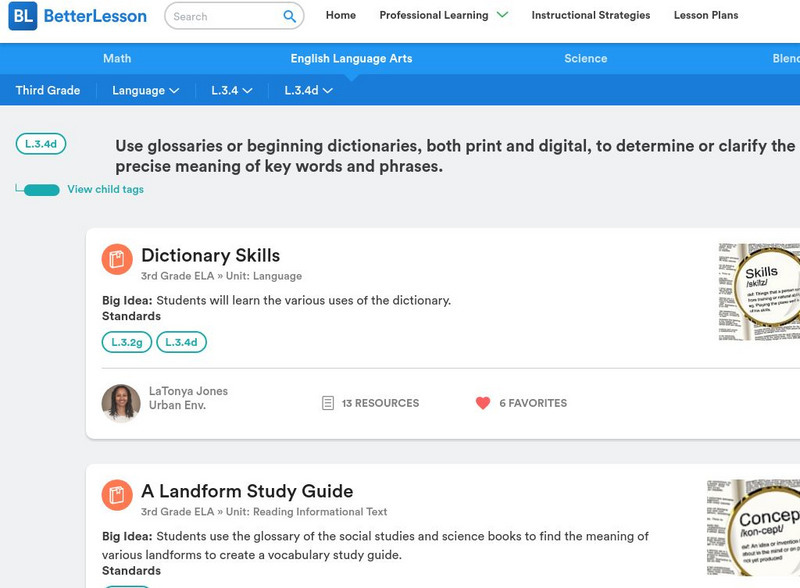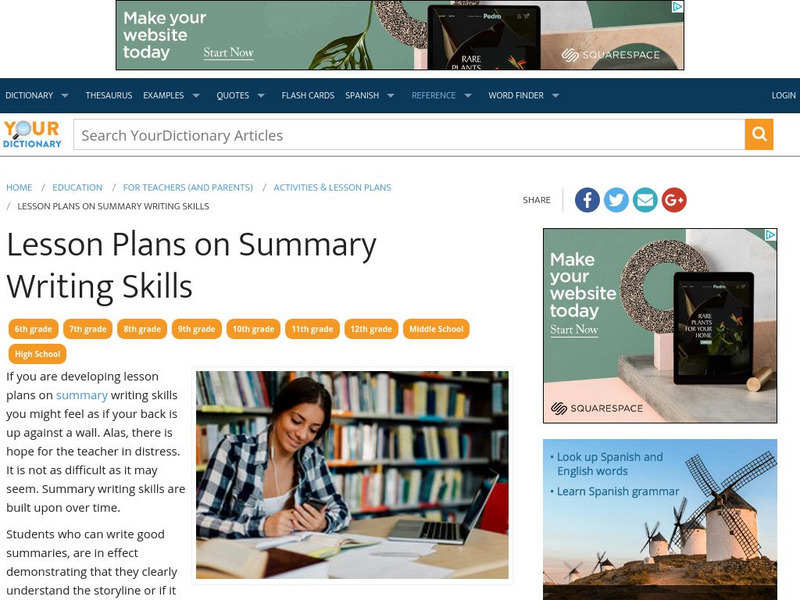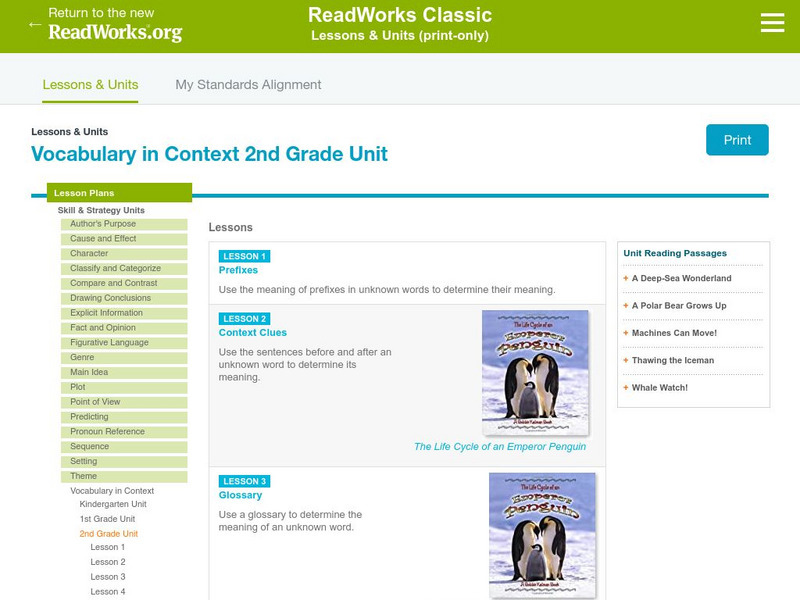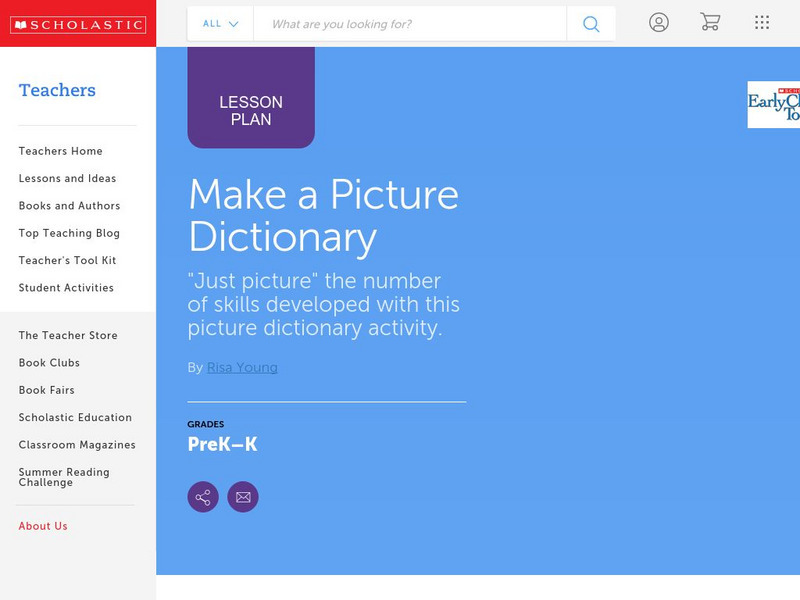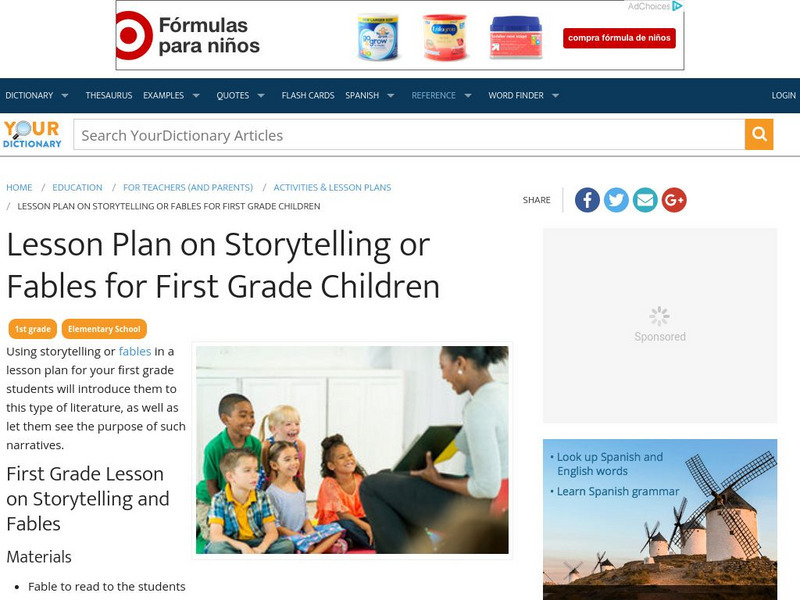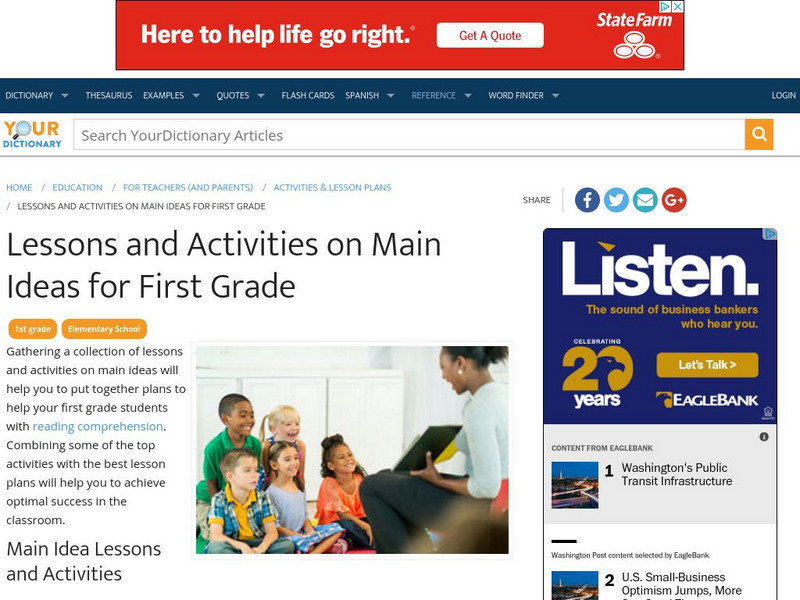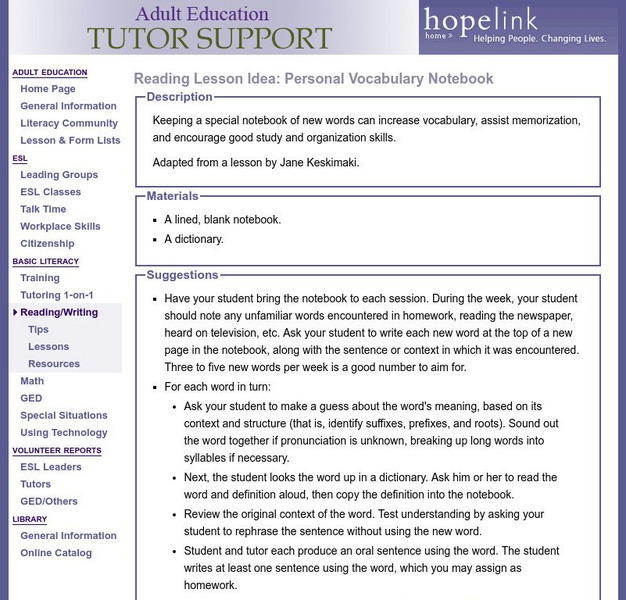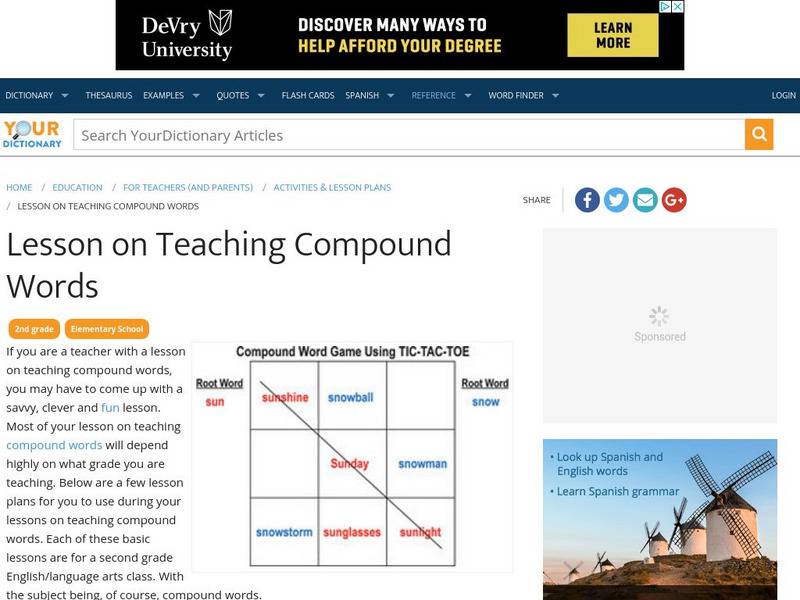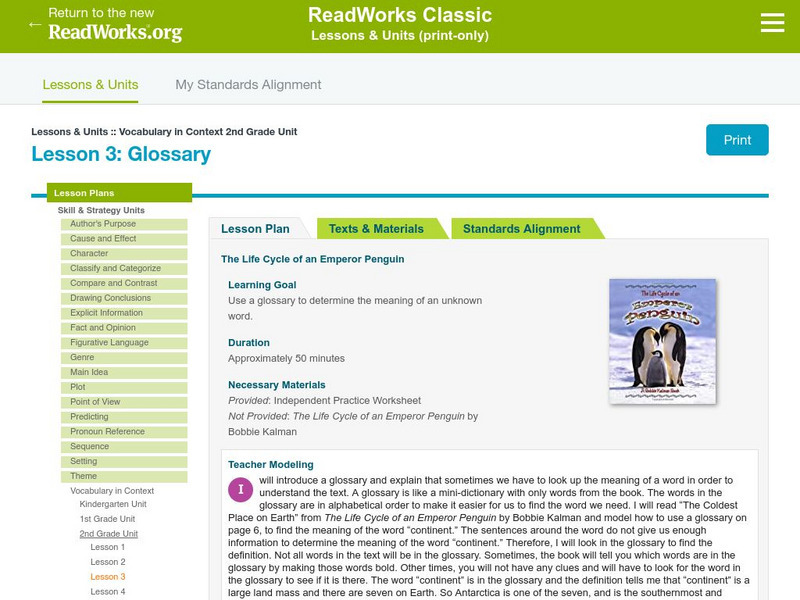Curated OER
OLYMPIC SHADOW BOXES
Students acquaint themselves with little-used library resources/reference materials and create shadow boxes to be displayed in the Media Center based on the research they've done regarding the Winter Olympics.
Curated OER
Friends or Foes?
Students discuss Spain's relationship with Europe and the U.S. and research incidents of American-European disagreements regarding international actions and policy. They write essays on how the world might be different if a multipolar...
Curated OER
Famous Americans Presentation
Fifth graders research a famous American; then do a presentation using Hyper-Studio, ClarisWorks or Power-Point.
Curated OER
Arizona Historical Persons Scavenger Hunt
Fourth graders use a research site directory and a scavenger hunt worksheet to locate information on early explorers and settlers in Arizona.
Curated OER
The Less Than Wondrous Gift
Students explore vocabulary connected to shopping and gain practice in reading and speaking in English.
Curated OER
OLYMPIC SHADOW BOXES
Pupils, in groups, use library reference materials to research an Olympic sport and create a visual display/shadow box to represent it.
Curated OER
Geography and Social Sciences
Students identify and explain how geography is connected to other academic areas and historical events.
Curated OER
Sketching Perspectives
Students list perspective types, identify views, list uses for perspectives and correctly define terms associated with perspectives.
Curated OER
Looking for Newton
Students discuss the rhyming pattern of various types of poetry. With a focus on limericks, they follow the specific rhyme scheme and create a limerick about Newton. They share their poem with the class and write another one related to...
Curated OER
Speaking of the Speaker
Students deconstruct an obituary and examine the elements and incidents of a person's life that were chosen to memorialize in an obituary. They research a notable American and write and obituary about their life.
Read Works
Read Works: Vocabulary in Context 2nd Grade Unit: Dictionary
[Free Registration/Login Required] This website provides a lesson in which students learn to use a dictionary to determine the meanings of unfamiliar words. The lesson utilizes the book The Mitten by Jan Brett and includes directions for...
Better Lesson
Better Lesson: L.3.4d: Use Glossaries or Dictionaries to Determine Meaning
Links to 2 lessons and activities that build student skills in standard L.3.4d: Use glossaries or beginning dictionaries, both print and digital, to determine or clarify the precise meaning of key words and phrases.
Love To Know Media
Your Dictionary: Lesson Plans on Summary Writing Skills
This article focuses on how to help teachers write lesson plans that will aid students in learning to write clear, concise summaries of movies and literary works.
Read Works
Read Works: Grade 2: Four Lesson Unit: Vocabulary in Context
[Free Registration/Login Required] A series of four lesson plans designed to develop young scholars' vocabulary skills including understanding prefixes, using context clues, and using a glossary and a dictionary. Lessons are based on the...
Scholastic
Scholastic: Make a Picture Dictionary
Children will create a picture dictionary to encourage the development of letter-sound recognition and fine-motor and creative-thinking skills, and increase their awareness about informational text.
Love To Know Media
Your Dictionary: Lesson Plan on Storytelling or Fables for First Grade Children
This is a lesson plan for teaching storytelling and/or fables to first graders including listening, reading, lesson learned (moral), and follow up ideas.
Love To Know Media
Your Dictionary: Lessons and Activities on Main Ideas for First Grade
This site offers links to several lesson plans for teaching main ideas to first and second graders; it also provides and explains some activities for teaching the main idea to first graders.
Hopelink
Hopelink: Reading Lesson Idea: Personal Vocabulary Notebook
This site has a simple but direct approach to building your vocabulary. Keeping a special notebook of new words can increase vocabulary, assist memorization, and encourage good study and organization skills. L.11-12. 6 Vocabulary
Love To Know Media
Your Dictionary: Lesson on Teaching Compound Words
This lesson focuses on teaching compound words and is specifically designed for second grade; however, it could be adjusted for other grades.
Other
Wisewire: Grade 3 Playlist: Clues to Unknown Words Using Known Roots
A dictionary is not the only way to figure out the meaning of new words. Readers also can look for familiar word parts. These word parts might appear in other words that readers already know. By looking for familiar word parts, including...
Read Works
Read Works: Vocabulary in Context 2nd Grade Unit: Glossary
[Free Registration/Login Required] A lesson plan in which learners learn to use a glossary to determine the meanings of unfamiliar words. Lesson utilizes the book The Life Cycle of an Emperor Penguin by Robin Johnson and Bobbie Kalman...
ReadWriteThink
Read Write Think: Shared Spelling Strategies
Contains plans for a lesson that will provide students with strategies for spelling unfamiliar words. Students are asked to use phonological awareness and visual recall, analyze alternative spellings, and use a variety of resources...
ReadWriteThink
Read Write Think: Internalization of Vocabulary Through the Use of a Word Map
Students practice with words and develop both denotative and contextual knowledge through two agents-purposeful sequencing of steps and collaboration with peers.
